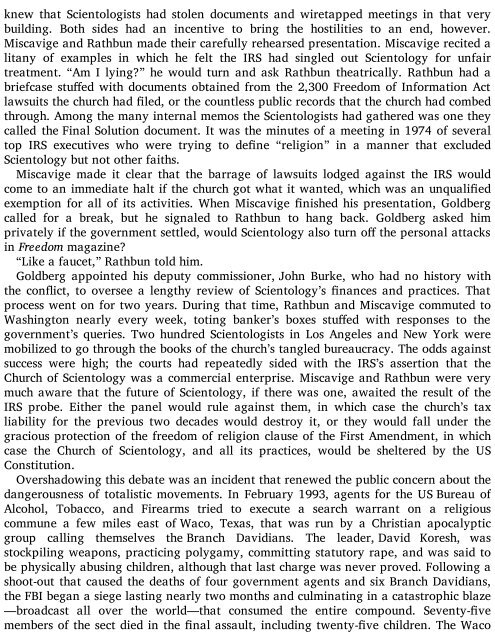going-clear-scientology-hollywood-and-the-prison-of-belief-by-lawrence-wright-2
going-clear-scientology-hollywood-and-the-prison-of-belief-by-lawrence-wright-2
going-clear-scientology-hollywood-and-the-prison-of-belief-by-lawrence-wright-2
Create successful ePaper yourself
Turn your PDF publications into a flip-book with our unique Google optimized e-Paper software.
knew that Scientologists had stolen documents <strong>and</strong> wiretapped meetings in that very<br />
building. Both sides had an incentive to bring <strong>the</strong> hostilities to an end, however.<br />
Miscavige <strong>and</strong> Rathbun made <strong>the</strong>ir carefully rehearsed presentation. Miscavige recited a<br />
litany <strong>of</strong> examples in which he felt <strong>the</strong> IRS had singled out Scientology for unfair<br />
treatment. “Am I lying?” he would turn <strong>and</strong> ask Rathbun <strong>the</strong>atrically. Rathbun had a<br />
briefcase stued with documents obtained from <strong>the</strong> 2,300 Freedom <strong>of</strong> Information Act<br />
lawsuits <strong>the</strong> church had led, or <strong>the</strong> countless public records that <strong>the</strong> church had combed<br />
through. Among <strong>the</strong> many internal memos <strong>the</strong> Scientologists had ga<strong>the</strong>red was one <strong>the</strong>y<br />
called <strong>the</strong> Final Solution document. It was <strong>the</strong> minutes <strong>of</strong> a meeting in 1974 <strong>of</strong> several<br />
top IRS executives who were trying to dene “religion” in a manner that excluded<br />
Scientology but not o<strong>the</strong>r faiths.<br />
Miscavige made it <strong>clear</strong> that <strong>the</strong> barrage <strong>of</strong> lawsuits lodged against <strong>the</strong> IRS would<br />
come to an immediate halt if <strong>the</strong> church got what it wanted, which was an unqualied<br />
exemption for all <strong>of</strong> its activities. When Miscavige nished his presentation, Goldberg<br />
called for a break, but he signaled to Rathbun to hang back. Goldberg asked him<br />
privately if <strong>the</strong> government settled, would Scientology also turn o <strong>the</strong> personal attacks<br />
in Freedom magazine?<br />
“Like a faucet,” Rathbun told him.<br />
Goldberg appointed his deputy commissioner, John Burke, who had no history with<br />
<strong>the</strong> conict, to oversee a lengthy review <strong>of</strong> Scientology’s nances <strong>and</strong> practices. That<br />
process went on for two years. During that time, Rathbun <strong>and</strong> Miscavige commuted to<br />
Washington nearly every week, toting banker’s boxes stued with responses to <strong>the</strong><br />
government’s queries. Two hundred Scientologists in Los Angeles <strong>and</strong> New York were<br />
mobilized to go through <strong>the</strong> books <strong>of</strong> <strong>the</strong> church’s tangled bureaucracy. The odds against<br />
success were high; <strong>the</strong> courts had repeatedly sided with <strong>the</strong> IRS’s assertion that <strong>the</strong><br />
Church <strong>of</strong> Scientology was a commercial enterprise. Miscavige <strong>and</strong> Rathbun were very<br />
much aware that <strong>the</strong> future <strong>of</strong> Scientology, if <strong>the</strong>re was one, awaited <strong>the</strong> result <strong>of</strong> <strong>the</strong><br />
IRS probe. Ei<strong>the</strong>r <strong>the</strong> panel would rule against <strong>the</strong>m, in which case <strong>the</strong> church’s tax<br />
liability for <strong>the</strong> previous two decades would destroy it, or <strong>the</strong>y would fall under <strong>the</strong><br />
gracious protection <strong>of</strong> <strong>the</strong> freedom <strong>of</strong> religion clause <strong>of</strong> <strong>the</strong> First Amendment, in which<br />
case <strong>the</strong> Church <strong>of</strong> Scientology, <strong>and</strong> all its practices, would be sheltered <strong>by</strong> <strong>the</strong> US<br />
Constitution.<br />
Overshadowing this debate was an incident that renewed <strong>the</strong> public concern about <strong>the</strong><br />
dangerousness <strong>of</strong> totalistic movements. In February 1993, agents for <strong>the</strong> US Bureau <strong>of</strong><br />
Alcohol, Tobacco, <strong>and</strong> Firearms tried to execute a search warrant on a religious<br />
commune a few miles east <strong>of</strong> Waco, Texas, that was run <strong>by</strong> a Christian apocalyptic<br />
group calling <strong>the</strong>mselves <strong>the</strong> Branch Davidians. The leader, David Koresh, was<br />
stockpiling weapons, practicing polygamy, committing statutory rape, <strong>and</strong> was said to<br />
be physically abusing children, although that last charge was never proved. Following a<br />
shoot-out that caused <strong>the</strong> deaths <strong>of</strong> four government agents <strong>and</strong> six Branch Davidians,<br />
<strong>the</strong> FBI began a siege lasting nearly two months <strong>and</strong> culminating in a catastrophic blaze<br />
—broadcast all over <strong>the</strong> world—that consumed <strong>the</strong> entire compound. Seventy-ve<br />
members <strong>of</strong> <strong>the</strong> sect died in <strong>the</strong> nal assault, including twenty-ve children. The Waco


